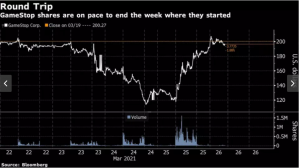 Another Wirecard? Invoices Backing Greensill-Issued Bonds Never Existed, Administrator Finds
Another Wirecard? Invoices Backing Greensill-Issued Bonds Never Existed, Administrator Finds
As the collapse of Greensill Capital threatens to ensnare former PM David Cameron in a humiliating public probe, the Financial Times on Thursday reported some disturbing new details that appear to suggest Greensill wasn’t merely reckless, but potentially guilty of a Wirecard-style fraud.
According to the FT, Greensil’s administrator – who is responsible for winding down whatever assets remain and managing creditors’ claims -“has failed to verify invoices underpinning loans to Sanjeev Gupta, after companies listed on the documents denied that they had ever done business with the metals magnate.”

 Five ways Biden could crack down on dirty money and financial secrecy
Five ways Biden could crack down on dirty money and financial secrecy GameStop Takes $6 Billion Round Trip as Results Shrugged Off
GameStop Takes $6 Billion Round Trip as Results Shrugged Off Joshua Mitts, Ph.D is an Associate Professor of Law at Columbia Law School. Joshua Mitts, who joined the faculty in 2017, uses advanced data science for his research on corporate and securities law. His primary focus is on information disclosure in capital markets, consumer financial protection, and related topics in law and finance. Mitts employs empirical methods, including statistical analysis and machine learning, for his research on short-selling, informed trading on cybersecurity breaches, information leakage and hedge-fund activism, insider trading on corporate disclosure, and information transmission in financial markets.
Joshua Mitts, Ph.D is an Associate Professor of Law at Columbia Law School. Joshua Mitts, who joined the faculty in 2017, uses advanced data science for his research on corporate and securities law. His primary focus is on information disclosure in capital markets, consumer financial protection, and related topics in law and finance. Mitts employs empirical methods, including statistical analysis and machine learning, for his research on short-selling, informed trading on cybersecurity breaches, information leakage and hedge-fund activism, insider trading on corporate disclosure, and information transmission in financial markets.